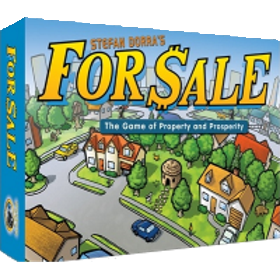נדל"ן בקטן
 נדל"ן בקטן הוא משחק מהיר של הימורים ושקרים, כדי לקבל את הנכסים הגבוהים היותר.
נדל"ן בקטן הוא משחק מהיר של הימורים ושקרים, כדי לקבל את הנכסים הגבוהים היותר.
זה לא כל כך משמעותי כמה אתה משלם על הנכסים, אלא בעבור כמה אתה מוכר אותם.
נהל את כספך בחכמה במהלך המכירה הפומבי והשגת הנכסים, ואז תערים (או תנחש) ותגבר על יריבך בשלב המכירה.
עליך להיות השחקן העשיר ביותר בסוף המשחק כדי לנצח!
מספר שחקנים: 3 - 6
משך המשחק: 8 mn
מורכבות: 1 / 5
שחקנדל"ן בקטן ו978 משחקים אחרים ברשת.
אין צורך בהורדה - שחק ישירות מהדפדפן.
עם חברים ואלפי שחקנים מכל העולם.
חופשי.

שחקנדל"ן בקטן ו978 משחקים אחרים ברשת.
אין צורך בהורדה - שחק ישירות מהדפדפן.
עם חברים ואלפי שחקנים מכל העולם.
חופשי.

תקציר החוקים
In a game with 3-4 (5-6) players, each player receives 18 (14) coins. With three players, six property cards and six currency cards are removed. With four players, two property cards and two currency cards are removed. Hence, the number of rounds in each phase depends on the number of players and is equal to 8, 7, 6, and 5 with 3, 4, 5, and 6 players respectively.
For Sale is comprised of two sections: bidding and selling.
Bidding Each player in turn will be given the chance to 'bid' or 'pass' on a property. If you pass you are given the first card on the left for half of your current bid. If you have not placed a bid yet, you get the lowest value card for no fee. If you bid, the game continues until all players have had a chance to bid. It then goes around again and gives players the option to bid again until someone passes. The cards are then given out in order of who either passes first or has the highest bid. Strategically you could bid low just to ensure that you do not get the lowest card, however, if everyone else bids too then you may end up paying for a card you could have gotten for free.
Passing If a player passes, they take the property that remains on the table with the lowest value. They also take back half of their bid (rounded down). For example, if a player had previously bid $3,000, but ultimately decides to pass, they take back $1,000 into their hand.
The rest of the money is returned to the bank and is placed out of the game. After all players but one have passed, the remaining bidding player takes the highest-valued property, but pays the full amount of their bid to the bank.
It is not necessary to bid anything to gain the least valuable property. You can pass, pay nothing and secure the least valuable property at no charge. Depending on your position and who is the first to pass, you could end up with a good card without bidding any money if others have passed before you.
How to bid on BGA: You click on the little silver coins to the value of the bid that you would like to make. You then click 'bid'.
Selling There are 30 money cards, the highest of which is $15,000 and the lowest is $0. (There are two of each -- $15,000, 14,000, 13,000, etc. -- skipping $1,000). In each round of selling, the values that appear are determined randomly. Sometimes the highest is $12,000, for example. You then select which property to 'sell' and hope that you have a higher card number than anyone else in that round. The player selling the highest-numbered property card gets the highest money card; the second-highest money card goes to the player selling the second-highest property card, and so on.
Properties There are 30 property cards, the highest of which is 30 and the lowest is 1. (There is one of each number.)
End of game The person who has the most money from selling + left over bidding money is the winner. If any players are tied, the tied player with the most bidding money left over wins the tie. If there is still a tie, the tied player with the highest property card wins the tie.
In a BGA game's results, the Coins & Property tiebreaker is calculated as a number: 100 x (# coins left over) + highest property. For example, suppose three players tie. Player 1 had 3 coins left over and their highest property was 27. Player 2 had 3 coins left over and their highest property was 24. Player 3 had 5 coins left over and their highest property was 16. BGA would give the following values in the tiebreaker:
Player 1: 100*3 + 27 = 327
Player 2: 100*3 + 24 = 324
Player 3: 100*5 + 16 = 516
So Player 3 would win the tie, then Player 1, and Player 2 would be last.


